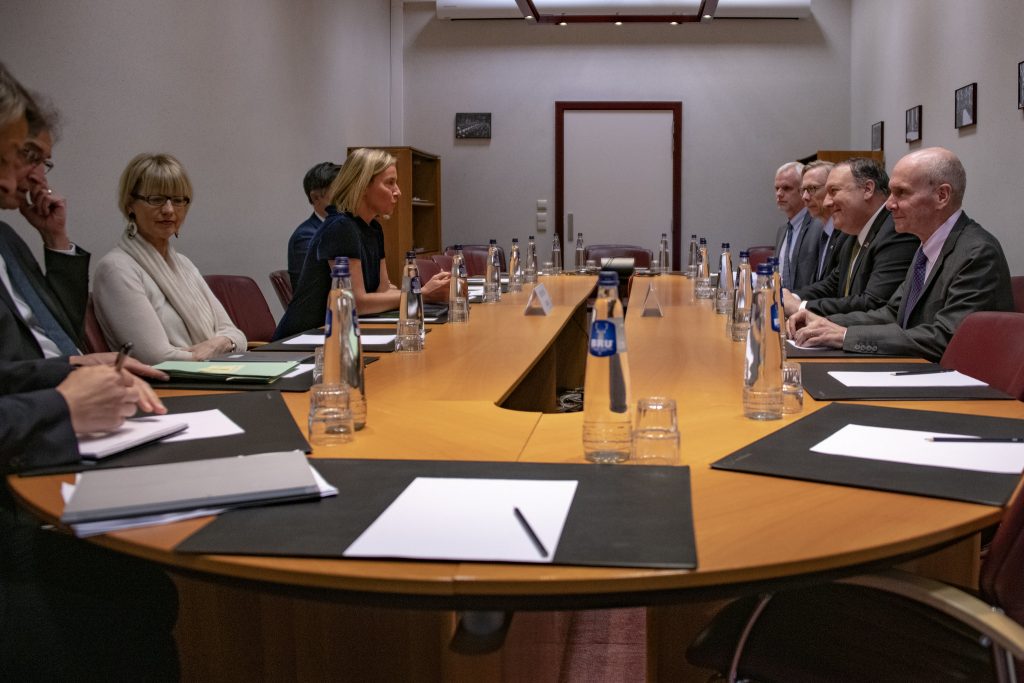State, DoD Letter Warns European Union to Open Defense Contracts, Or Else
Posted on

Secretary of State Mike Pompeo meets with European Union’s Federica Mogherini in Brussels, May 2019.
WASHINGTON: Pentagon and State Department officials have told the European Union they’re “deeply concerned” over plans to potentially exclude US defense firms from competing for billions worth of new arms deals, suggesting the US could slap restrictions on buying European defense equipment in retaliation.
At issue is the proposed $14 billion European Defence Fund, and a host of procurement programs under the the Permanent Structured Cooperation, or PESCO, the European economic alliance is undertaking.
While the May 1 letter from Ellen Lord, Pentagon procurement chief, and Andrea Thompson, State’s undersecretary for arms control and international security, expressed general support for the EU initiatives, it made clear the US would like to see significant changes in the draft language before the 28-country bloc votes on them as early as next month.
The language in both documents, the US argues, feature intellectual property and export control restrictions that would act as “poison pills” to “effectively preclude participation by any company that uses U.S.-origin technology.”
Overall, Lord and Thompson write, the conditions outlined in the EDF and PESCO documents “represent a dramatic reversal of the last three decades of increased integration of the transatlantic defense sector.” If the restrictions are kept in place, the US officials warn, “it is clear that similar reciprocally imposed U.S. restrictions would not be welcomed by our European partners and Allies, and we would not relish having to consider them in the future.”
But EU officials defended their efforts this week.
Asked about the US letter, an EU spokesperson replied in an email that the EDF and PESCO will “complement and strengthen NATO,” at a time in which the Trump administration has made that a key policy goal, and “enable Europe to shoulder its fair share of the burden and responsibility for global security.”
But it’s clear the letter has rankled the Europeans. “The EU has an open and competitive defense procurement framework, in fact more so than the US procurement market,” the spokesperson wrote. “In the EU, there is no ‘Buy European Act.’ 81 percent of the total value of international defense contracts in Europe go to US firms. The US defense market is three to four times larger than that of the EU, and yet imports from the EU are marginal for the US, while EU imports from the US are significant.”
The official said that American companies with subsidiaries in the EU will remain eligible for funding under the EDF subject to security conditions “which are similar – in fact less restrictive – to the ones that EU companies face in the US.”
The EU’s High Representative Federica Mogherini told reporters Tuesday that PESCO projects aren’t meant to be a vehicle to increase transAtlantic ties, and the EU will gladly continue doing business with non-EU defense companies. The program “is not defined to be an instrument for partnership,” she said. “It does not substitute other partnerships, including in the defense industry and research that we have already in place and that are essential for us,” she added.
For years, non-NATO countries like Sweden and Finland have drawn closer to NATO and have increased ties with US defense firms while also building their own domestic defense capabilities, though the relationship hasn’t always been smooth.
While the US government is concerned over US companies being excluded, the PESCO effort has been developed explicitly to bolster the ability of European countries to produce their own weapons systems, cyber capabilities, and surveillance technologies. So-called “third states” — non EU members — may ask to participate in PESCO projects, but all of the member states must vote to allow them in.
Lord and Thompson argue that walling-off EU projects from NATO efforts would lead to duplication and waste, while decreasing interoperability between the EU and NATO. It could also “potentially tum the clock back to the sometimes divisive discussions about EU defense initiatives that dominated our exchanges 15 years ago.”
In the end, the US letter is just the latest turn in what has been a complex, up and down relationship between the US and Europe under the Trump administration. The president has loudly condemned Washington’s closest allies in Europe for not spending enough on their own defense, while threatening to pull out of NATO. At the same time, the US has increased troop levels in Europe and pumped over $11 billion into the European Deterrence Initiative over the past two years, in an effort to upgrade US and allied basing, increase joint exercises, and modernize equipment on the continent to counter the Russian threat.
Subscribe to our newsletter
Promotions, new products and sales. Directly to your inbox.
